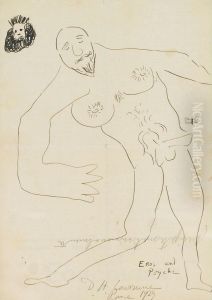David Herbert Lawrence Paintings
David Herbert Lawrence, known more commonly as D.H. Lawrence, was an English writer and poet, born on September 11, 1885, in Eastwood, Nottinghamshire, England. While not primarily known as a visual artist, Lawrence did produce paintings, but his fame and significant contribution to the arts primarily lie in his literary work. He was regarded as one of the most influential writers of the 20th century, with his novels, poems, plays, essays, and short stories exploring themes such as emotional health, vitality, spontaneity, and instinct.
Lawrence's upbringing in a coal mining town with a hard-working father and a mother who had a passion for education deeply influenced his views on the English class system and the dehumanizing effects of modernity and industrialization. These themes are prevalent in his literature. He attended the University of Nottingham and, after graduating, worked as a teacher before tuberculosis forced him to leave the profession.
As a writer, Lawrence's works were often controversial due to their frank depiction of sexuality, which led to censorship and misinterpretation of his literary intentions. Some of his most notable novels include 'Sons and Lovers' (1913), 'The Rainbow' (1915), and 'Women in Love' (1920). 'Lady Chatterley's Lover' (1928) was particularly scandalous, with its explicit descriptions of the physical relationship between a working-class man and an aristocratic woman. The novel was banned in England and the United States for its obscene content, and it was not published in its full form in the UK until 1960, after a landmark obscenity trial.
Aside from his novels, Lawrence also wrote several volumes of poetry, travel literature such as 'Sea and Sardinia' (1921), and essays on art and politics. His exploration of human consciousness and critique of industrialization were ahead of his time, influencing later movements such as the counterculture of the 1960s.
D.H. Lawrence's health declined over the years, and in 1930 he died in Vence, France, of complications from tuberculosis. Although his reputation as a painter is minimal, his artistic endeavors in this field were an extension of his belief in expressing the fullness of human experience. After his death, Lawrence's literary reputation grew, and he is now appreciated not only for his thoughts on the human condition but also for his vivid portrayal of the English landscape and his innovative use of language.
